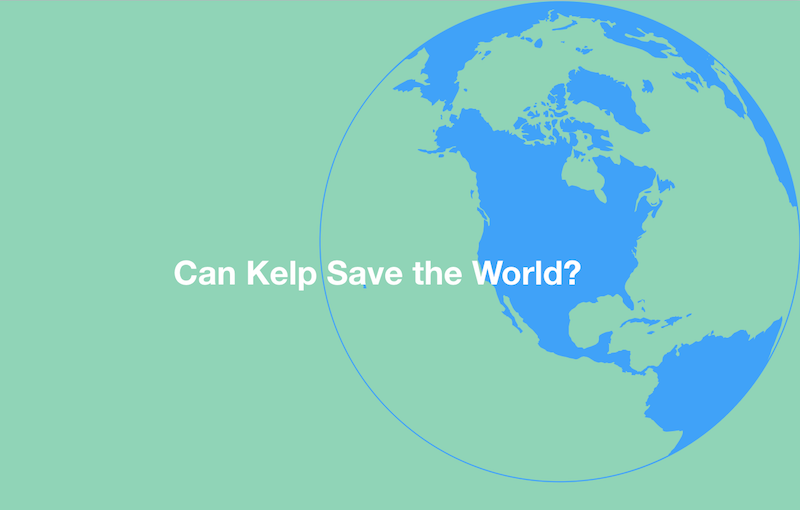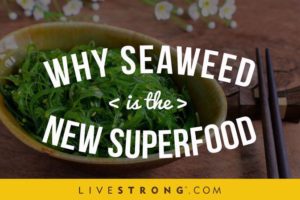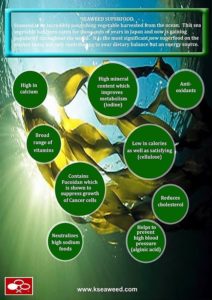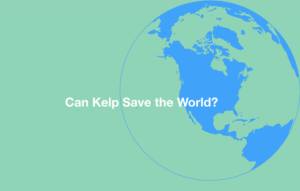Approach3 – SarahS

Background:
Kelp, green and nutritious, could be Maine’s ticket into a multibillion-dollar global aquaculture industry. The seaweed helps bring nature back into balance, eliminating compounds that are overabundant in Maine’s waters. As the kelp grows, it plucks carbon dioxide, nitrogen and phosphorous from the water to photosynthesize. When farmers harvest their kelp, those compounds are removed along with it, leaving behind more favorable waters. Acidic waters, caused by heightened levels of CO2 in the ocean, make it hard for organisms like shellfish to create calcium carbonate, necessary to form their exoskeletons. In its findings last year, it was recommended by researchers that Maine “preserve, enhance and manage a sustainable harvest of kelp, rockweed and native algae and preserve and enhance eelgrass beds” for remediation.
In addition to these climate change combatting elements of kelp, it is also one of Earth’s most nutrient-dense foods, full of the vitamins and minerals our bodies need to be healthy. Pioneers in seaweed aquaculture have developed zero-input farming that uses no arable land, no fresh water, and no fertilizers. In fact, studies have shown that seaweed cultivation contributes to the reduction of ocean acidification, helping to maintain the delicate balance of marine ecosystems.
Explanation:
My project overview:
I will be making an Ecoliteracy video aimed at younger children and their parents to educate them on the benefits of the nutritional value of kelp as a superfood, and kelp farming in Maine as a means to reduce carbon emissions and combat climate change. This video will be informative but also fun and engaging, since it is aimed at children.
Could you gear this type of video to aquaculture?
This eco-literacy video would be aimed at teaching kids about Aquaculture in Maine, more specifically Kelp, and how it can help to combat climate change; as well as provide excitement and incentive for kids and parents to try this nutrient-dense superfood at home.
Are there just some key eco-literacy ideas you could convey simply?
My main subject would be on Kelp farming in Maine as an untapped resource for food and as a way to combat climate change and reduce the planet’s carbon levels. I would include information such as:
“The Food and Agriculture Organization of the United Nations reports that by 2050 feeding the world’s 9 billion population with current land-based farm models is an environmental and socioeconomic risk. The future of agriculture lies in improving and investing in natural resources, like kelp farming, researchers say.”
“It surprised us. There are other species of seaweed, but kelp is absorbing enough carbon dioxide that it will have a significant impact to restore water quality, and every year sugar kelp farming is increasing,”

What kind of message do you want to send?
I want to send the message that it isn’t difficult to help the planet. It doesn’t take a big organization or fancy equipment. It starts with educating the next generation and taking small steps now, not later. More specifically, the message here is that kelp farming in Maine is a viable solution for combatting greenhouse gases. I will go into how this happens in my final project. I also will convey what the parents of these children (the audience) can do to further the research and how to support kelp farming. Again, I will go into more detail in my final project.

And how will the message help?
I want to provide an accessible outlet for Mainers and their children to help the planet. Most people don’t consider kelp/seaweed as a food resource unless they are out at an Asian restaurant. My message will help this sea vegetable gain popularity, kind of like how Acai bowls and Kale is now. In gaining popularity, the demand for kelp and seaweed will grow and along with it the demand for planting kelp, which in itself will help combat carbon level and will ultimately help Mother Earth.

What is your target audience?
My target audience for this project is elementary-aged children (ages 4-10) and their parents. Particularly the type of parent who advocates for a holistic approach to feeding their child and lives in Maine. (Think a “Whole Foods” type parent).
Credits: OceanBalance.com; OceanApproved.com; This article from the Bangor Daily News; This article from National Geographic; Joline Blais for her feedback on my intent.
Simple Budget:
Material: Some kind of video making software, be it After Effects, Premiere Pro, Final Cut Pro, etc…$20+tax
Time: Between collecting information, organizing, and compiling…60 hours…$200+tax
Build: Putting together the video in a fun and informative manner…$100+tax
Total Estimated Cost: $350
You must be logged in to post a comment.